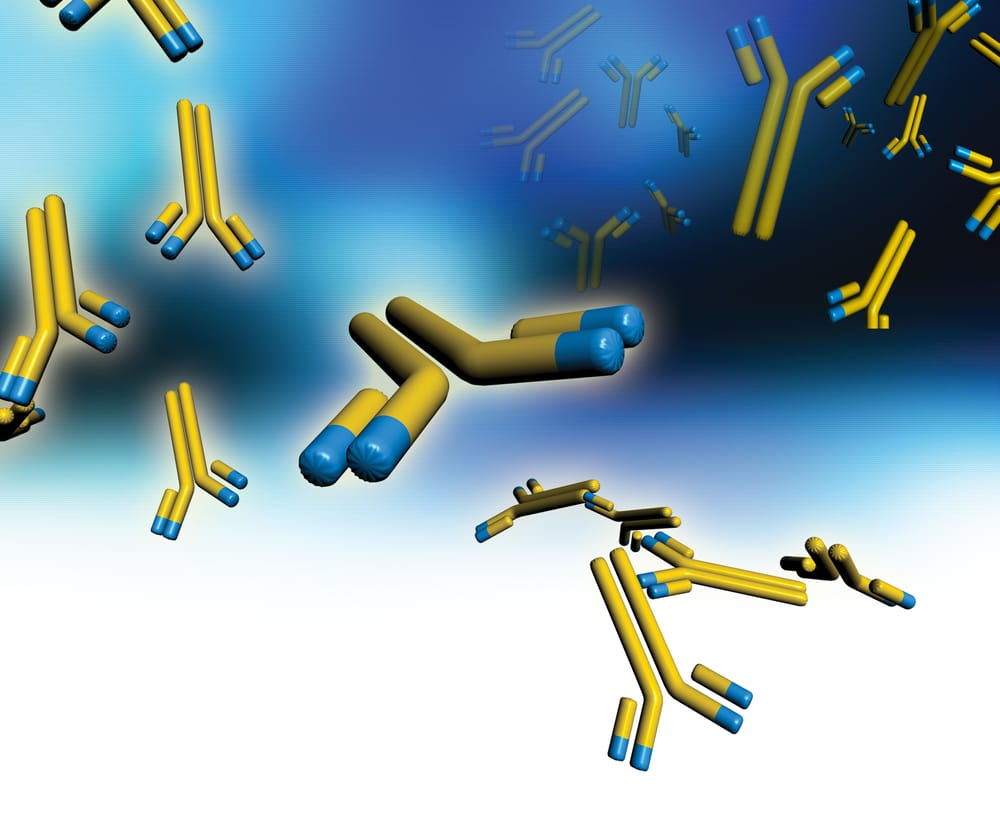Can immunotherapy cure cancer? Fighting cancer with our own immune system. It sounds promising. At the end of the 1800s, the controversial Dr. William Coley suggested that infections fuel the immune response of cancer patients. Their agitated immune response in some cases led to healing. Now, more than 100 years later, scientists try to give the immune system a targeted boost to attack tumors. In 2013, Science Magazine named Cancer Immunotherapy as the Breakthrough of the Year. Several Belgian companies are working on this topic and each has its own point of reference.
When our immune system is working properly, pathogenic cells are marked with “antibodies”, and eliminated by our white blood cells. Some cancer cells however inactivate the immune system or hide from it. The immune system relies on “immune checkpoints”, recognizing specific proteins on endogenous cells to avoid an auto-attack. Some cancer cells also manage to circumvent these checkpoints producing the same recognition proteins. Belgian companies and research centers play an important role in the development of innovative techniques so that the immune system can fight cancer better.
Stop the attack on our immune system
Some cancers produce enzymes that break down the essential amino acid tryptophan. As a result, the immune cells are blocked and the cancer cells survive. The research of the renowned Ludwig Institute for Cancer Research (Brussels) was the basis for cooperation between iTeos (Gosselies) and Pfizer (Brussels) for the development of IDO1 (indoleamine 2,3-dioxygenase) and TDO (tryptophan 2,3-dioxygenase) inhibitors. These are components that impede IDO1 and TDO, enzymes that break down tryptophan, allowing the immune system to function normally and kill off the cancer. This research is currently in preclinical phase. iTeos and Pfizer also continue looking for other targets that play an important role in the ability of tumors to evade the immune response.
Special designed antibodies
arGEN-X (Zwijnaarde) develops highly differentiated antibodies, based on the conventional antibodies of llamas. These antibodies bind specific targets on cancer cells and can have additional modifications to stimulate white blood cells to immediately launch an attack against the tumor. These antibodies can also be designed to stay longer in the blood circulation, resulting in a longer action time. arGEN-X has recently developed a special designed antibody blocking the novel immune checkpoint GARP. It has the potential to block the ability of tumors to escape the patient’s immune system.
Tim Van Hauwermeiren, CEO of arGEN-X, is a bio-engineer. He started his career at Proctle & Gamble but returned after 9 years to biotech at Ablynx. He always wanted to become a general manager and therefore decided to obtain an MBA. In 2008, he established arGEN-X, together with Hans de Haard and Torsten Dreier. “Cancer cells possess a bunch of tricks to escape from an immune attack. The challenge lies in the creation of the appropriate antibodies. Our SIMPLE Antibodies have multiple functionalities. With our SIMPLE Antibody™ platform and additional engineering technologies we can modulate the V-region and the Fc tail of an antibody, creating highly differentiated antibodies with several mode of actions,” commented Van Hauwermeiren, “cancer cells can rather easily circumvent one functionality, but it is hard to fight against a combination of more targeted functionalities.”
Viral Attack
Another option for the treatment of cancer with immunotherapy is in attacking tumors with viruses. However, the strength of viruses that occur in nature is limited, and the risk of severe infection and even death is large. Nevertheless, it is possible to enhance the virus genetically in such a way that it can only replicate in cancer cells. There it has a double effect. On the one hand, it kills cancerous cells by its cytotoxic activity, and on the other hand it evokes a natural immune response when the cancer cell is broken down. Amgen, an international company with offices in Brussels, is developing this technology. Furthermore, Amgen also works on ADC (Antibody drug conjugates). These are antibodies that recognize a specific type of cancer to which a drug is linked, that kills the cancer cell.
“People tend to be pessimistic about cancer, but the developments in cancer immunotherapy are rapid’’ says Van Hauwermeiren, “for example, it is already possible to convert some deadly blood cancers to a chronic, stabilized disease, allowing a good quality of life. The most important result of cancer immunotherapy is that the long-term survival is significantly longer compared to any other therapy”. Not all stories are successful, though. In 2014, GSK (Rixensart) closed a large part of its cancer immunotherapy research, despite big investments, after negative results in a phase III project. Van Hauwermeiren comments: “Regardless of what happened at GSK, I am very positive. The field of immunotherapy is exploding. We should focus on the tumor microenvironment to elucidate how cancer cells evade the immune system. Next, the challenge is to combine the right antibodies and drugs to unmask the hiding techniques of the cancer cells. This can double the survival rate.” Other important players in cancer immunotherapy are BMS (Braine-l’Alleud) and Merck (Darmstadt, GE), that has an alliance with Pfizer on immune-oncology. De Duve institute, comprising research groups from Prof. Thierry Boon, Prof. Benoît Van den Eynde and Prof. Pierre Coulie, have an established reputation regarding this topic. Cutting edge research is also performed in the BioPark (Charleroi Brussels South) including different research institutes and ImmunXperts, a service company with expertise in immunogenicity.
Immunotherapy will become the new standard treatment method for cancer. In fact, I believe that pharma companies who are not active in immunotherapy, won’t play a role in the cancer field within a couple of years.”


